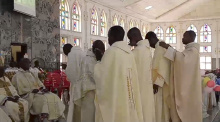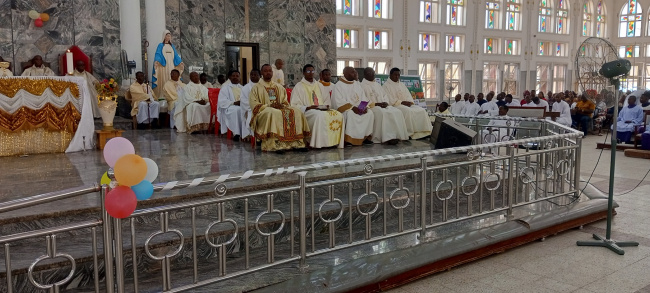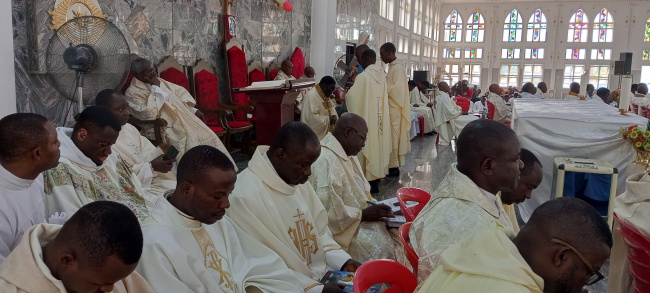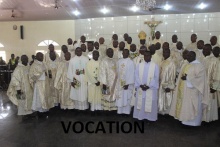GO TO WHERE YOU ARE SENT
Sermon at the Priestly Ordination in the Holy Family Cathedral, Sokoto, August 4, 2023 by Bishop Matthew Hassan KUKAH
By now, listening to my sermons, lectures or media chat, you must be bored hearing me talk always about my grand-mother. I did not know my grand-fathers on both sides of the divide. If you did not grow up with your grandmother, it is difficult for me to tell you how much you missed out in life and its lessons. Living with my grandmother was like being a preparatory school for growing up, getting married, raising a family and so on. As children, we ran errands and because we were always many around her, we shared our duties and responsibilities among ourselves because her errands were very many, ranging from bringing a calabash, fetching water, buying salt or delivering a message. Often, if she was cooking, we ran and hid because it was most likely that whoever got called would have to run an errand. For obvious reasons, grandmother’s voices were not always loud. And here is the catch.
If our grand-mother needed to send someone (she often forgot some of my cousin’s names) or she might want to send you but you might not be nearby. If you were within earshot, she would simply call you by name, say, Hassan. If Hassan did not answer, she would raise her voice slightly. This would mean that if Hassan wasn’t within reach, any cousin would be obligated to amplify the voice by raising his voice and calling Hassan who might be out playing. But if there was no one near to amplify the message, grand-mother would raise her voice, Haasssaaan. If there is no response, she would step outside and raise her voice, Hasssaaaaannnnnn loooooooou! Looou has no meaning as such. It is an expression of desperation and urgency. It is an appeal for assistance. If you hear someone being called with a loouu at the end, some obligation will fall on you to help transmit the message from one person to the other until it gets to Hassan. In this case, the voice is supposed to go as far as possible and by word of mouth, until it gets to where Hassan is. Whether he is playing in the square or in the river, one of the transmitters will finally have to say at close range, Hassan, grandma is calling you. This collective engagement in something as simple as the transmission of a message justifies the saying that it takes a village to raise a child!
I am using this story because I believe it has some little relevance to what I am going to say to you who will soon be ordained to the Catholic priesthood in the course of this holy Mass. I have often said during both my personal anniversaries of ordination to the priesthood or to the episcopacy that we should not really focus on ourselves but focus on those who amplified the voice of God to enable us finally step forward to answer the call. So, like my grandmother, we have to thank God for parents, siblings, school mates, friends, teachers, and all men and women of good will through whom God’s looooo finally reached us.
Not all of us were called like Samuel. Like little Samuel, we were not able to decipher the voice of God for what it was at the time. We may not have had an Eli to give us direction in the kind of dramatic way that the story is told to us in the Bible (1 Sam. 3: 1ff). Notwithstanding the lack of drama, our calls came in different shades and forms. It is when we look back now that we can see how the pieces all came together. Many of us went to the Seminary out of curiosity, some out of a personal feeling that we were hearing a voice. However, in real life, like my grand-mother’s voice, it was a distant echo and it grew closer and closer through many multiple replays and relays. Unlike running grand-ma’s errands, people who influenced us may not necessarily have said to us, Hassan, Hassan, come, God is calling you, run and run very fast!
Had someone said that God sent him to us, we would have stepped back in shock. We would ask, who are you for God to send you? Where did you see God? How did you hear his voice or how did you know He was the one? You sef, even if God wants to send someone to me, will it be some yeye boy like you! Samuel had it easy, he was sleeping in the sacristy and he was also with a very holy man. For many of us, when we look back, the voices of transmission were many, varied, haphazard and largely circumstantial.
Now, in real life, it is tempting that we feel a sense of achievement as we hear every year, priests calling for parishioners to rejoice with them as they celebrate five, ten or in some cases even one year of priesthood. These celebrations are often focused on congratulatory messages, fund raising and so on. In all of this, we are all tempted to attribute our success to our sense of hard work and dedication. We often focus on ourselves with little attention to those on whose shoulders we stood, from parents to friends, formators and teachers. We must be careful because in reality, we must re-echo the words of the Psalmist who said: Not to us Lord, not to us must but to your name must glory be given (Ps. 115:1).
Very soon, the ceremony of the ordination will commence. In the course of our ceremony, you will note that what we are performing today is not the act of a Bishop and his Priests simply engaged in a process of bringing more labourers into the vineyard. You will soon listen to how this ceremony is the result of the work of all of us. You will be shown how you as individuals and communities have contributed to making this ceremony possible. You will note that your responses to the enquiries of the worthiness of these candidates is the reason why they are here. You will also hear that those responsible for their formation are those who have told us that they are ready. I am therefore, merely putting a stamp of authority on a process that is the result of our collaboration and co-operation.
Today, we give thanks therefore to the owner of the vineyard who has graciously added new labourers into his vineyard. We must remind ourselves of the graciousness of the one who called us out his generosity. We must be reminded that an Ordination is not the Priesthood. In the same way, I have always told Nigerians not to forget that elections are not Governance nor for example is a Wedding a Marriage. These are rituals, ceremonies, rites of entry into lives that are marked by the choices we have made. Politicians choose to stand for elections, two people agree to get married, a young man or a young woman steps forward believing that they are called by God or that they are acting out the will of God for them. However, as we all know, the real life is often totally different. So, central to our lives as priests or married couples is faithfulness to the choices we make. We must therefore make sure that the words we utter today are etched in our memory. God has not given us the ability to see the future, to know what real married life or the real priesthood will look like.
Imagine that your son or daughter has just graduated and you are asked where you would like him or her to work. Imagine that as a newly ordained priest, you are asked where you would like to serve. In daily life, even when we have found a job in such much-sought after organisations as the Central Bank, the Federal Inland Revenue Services, the Nigerian National Petroleum Company, NNPC for example, many will still not be satisfied. Most may want to be where work may be less but the reward will be more. Some may want to be where there is easy money to be made. Imagine if a newly ordained Priest is asked where he would like to work after his ordination. We would naturally choose where life would be easy.
The story of Abraham and Lot illustrates this human predicament. In Genesis ch 13, we read the story in full. Briefly, we are told that when Abraham realised that his wealth and that of his kinsman, Lot had grown so much, he thought the best thing for them to do was to separate so they can manage their resources well. This made a lot of sense. The Bible says that: Abraham was very rich in livestock, in silver and gold….``Lot also had flocks and herds and tents so the land could not support them dwelling together for their possessions were so great that they could not dwell together and there was strife their herdsmen(v5-7). In wisdom Abraham decided that in order for their workers would not to fight, he set aside his privilege as the bearer of God’s promise and the elder and rather asked Lot to choose first. Lot did not disappoint. He could for example have said, Ah but you are my father, God’s chosen one, you are wiser, you know what is good for me, `I am not competing with you, who am I? Rather, we are told: Lot lifted up his eyes and saw that the Jordan valley was well watered and everywhere like the garden of the Lord, like the land of Egypt….Lot chose for himself, all the Jordan valley(v10)
The story of the two brothers, sons of Zebedee and their mother told in the Gospel of St. Matthew is an important illustration of this situation. You recall that the mother of the two brothers was the one who approached Jesus and said: Command these two sons of mine to sit, one at your right and the other at your left. First, the mother knew the powers that Jesus had and she must have heard or seen the miracles that Jesus had performed. She is not even asking Jesus to interview her children to see if they are qualified or interested in the assignments. However, we see from the story that it would seem both mother and sons had plotted this together. For, while Jesus was still speaking to their mother, doubting if she knew what she was asking for, when Jesus raised the question of whether they will be ready to drink from the same chalice with him, they enthusiastically answer: We can. We know the rest of the story. We know that in the end, Lot’s wife turned into a pillar of salt, we know that the apostles who announced their readiness to drink the cup were asleep when it mattered.
In reflecting on this, `I want to return to the title of my sermon which is, Go where you are sent. It may be difficult for us to believe or understand, but it is not for nothing that the Church places obedience at the heart of the priesthood. Jesus said: The cup that I am going to drink from, can you drink of it? The brothers were quick to answer even though they did not know what the taste of the cup was. St. Ignatius tells us that later in their lives, John who wanted to be at the head of all, John who did gra-gra and reached the tomb first, why did he yield ground to Peter? James on the other hand had become so zealous, he was the first to suffer martyrdom. Are you willing to drink of the cup that I shall drink? If we say yes in faith, there will be challenges and difficulties, but we indeed can drink of the cup.
In his letter to the Magnesians, S of Antioch warned that: Many invoke the Bishop’s name but do everything apart from him. Such men do not have a good conscience. My sons, this ceremony centres around you. In the course of the ceremony, you will receive the tools of your trade, to use a worn out expression. The efficacy and efficiency of these tools depends on how you preserve, polish and care for them. The Word of God will be entrusted to you. The Chalice and Ciborium will be entrusted into your hands. You will place your hands in the hands of the Bishop and promise Obedience. You will be told that your life and ministry centre around the respect, the awe and the aura which you build around the sacraments. As you were told at your baptism, a light has been entrusted to you to be kept burning brightly to the end. Do not succumb to hostile weather elements outside. Protect the trust that Jesus has given to you. Defend the faith and protect His Church. Do not waste your energy in the wild goose chase. The priesthood has not competitor. It is not an appointment. It is not a place to work for promotion of self. There are not rewards except the glory of God’s name.
Any priest who judges his mission by where he is sent to, by what comfort is available to him, by what opportunities for self-enrichment are available is a self-employed opportunistic charlatan and fortune seeker and has no place in the vineyard. Very soon, he will be exposed and will fall by the way side or slay himself by his own sword. We have all been called by the master of the vineyard. We must count ourselves most favoured. The master who has sent us is waiting and every assignment we get, no matter what we think is the motive of the Bishop must be taken as the Master’s wish. For those of us who think that we are intelligent, we are holy, we know better than those placed in authority over us, those of us who believe we should be working with more educated, or more influential people, remember that you are already qualified and so God cannot help you. St Paul has already warned us that: God doesn’t call the qualified; He qualifies those He chooses (1 Cor. 2: 1-5). God cannot educate those who already know, God cannot bless those who have already blessed themselves. God cannot put anything again into a cup that is full of pride. With our blessed Mother, we must say, my soul glorifies the Lord, He has looked forth upon us in our nothingness.
Finally, the title of my sermon is, Go to where you are Sent. If however, you will not go where you are sent, we will send those who will go. We chose this day very carefully for your ordination. It is a day set aside to honour St. John Mary Vianney. His story is too well known to us Priests and Seminarians. We chose this day so that you, our brothers who are being ordained today will hold his exemplary life before you as a model. He loved prayer and we all know that prayer is the only lubricant for the vehicle of our pastoral journey. Without prayer, the priest’s life will collapse sooner than later. St. John Vianney said that as he prayed, long journey’s seemed shorter. He encouraged us to immerse ourselves in prayer as a fish in water.
To all of us Christians, John Vianney warns that: Some of us appear in Church as if to say: I am just going to say a couple of words so I can get away quickly. We will get what we want from God if we ask with a lively and fairly pure heart. May St. John Vianney’s intercession accompany you and all of us in the vineyard. Amen




